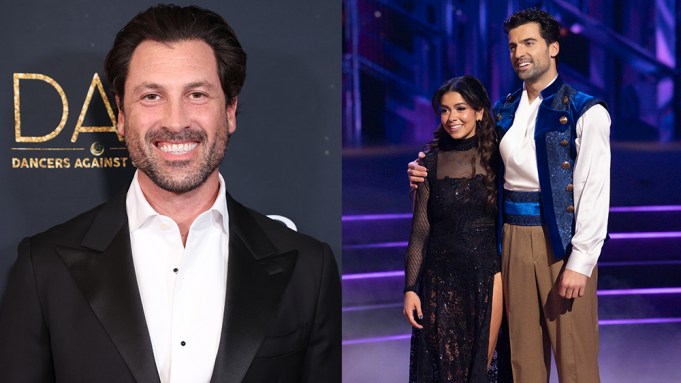The ballroom may glitter on Monday nights, but the drama surrounding Dancing with the Stars has spilled far beyond the dance floor this week. Celebrity contestant Jen Affleck has publicly rushed to defend her professional partner, Jan Ravnik, after pointed criticism from former DWTS champion and longtime fan-favorite Maksim Chmerkovskiy. The ballroom veteran, who helped shape the show’s golden era, recently questioned Ravnik’s qualifications and argued he “had no business” being on the program. The remarks ignited a passionate response among viewers, and eventually from Affleck herself.
The controversy unfolded during an episode of The Penthouse with Peta, a podcast hosted by Chmerkovskiy’s wife, two-time DWTS champion Peta Murgatroyd. While Murgatroyd attempted to provide balanced feedback on Affleck and Ravnik’s Wicked-themed foxtrot—highlighting effort and room for improvement—her husband openly bristled at the topic. Mid-conversation, Chmerkovskiy joked about leaving the set to avoid weighing in, before ultimately launching into a fiery critique that quickly went viral in the dance community.
Murgatroyd initially defended Ravnik’s learning curve. “He’s learning slowly,” she said. “It’s his first season. We have to give him grace for not understanding foxtrot technique.” Her tone suggested patience, even empathy. But Chmerkovskiy immediately rejected that approach. “No, we do not have to give him grace,” he countered sharply. “Are you kidding me?”
What followed was a rare moment of bluntness, even for Chmerkovskiy, who earned a reputation during his 17 seasons as both fearless and occasionally polarizing. He argued that Ravnik lacked ballroom foundation, technical quality, and partnership understanding—components he views as non-negotiable for any professional cast member. “I’m sorry, Jan has absolutely no business being a pro on Dancing with the Stars,” he continued. “He had no idea what a foxtrot is supposed to look like.”
Chmerkovskiy also expressed disappointment that, weeks into the season, no internal guidance had visibly course-corrected Ravnik’s choreography. According to him, one prior performance hinted at growth, only for the trajectory to “go off a cliff” soon after. His underlying frustration appeared rooted less in personal dislike and more in what he considered a lost opportunity—to match Affleck with someone capable of elevating her rapidly.
The former champion ultimately framed the pairing as a disservice to the celebrity competitor. “Affleck has no partner,” he said, implying Ravnik cannot provide the technical mentorship expected. Murgatroyd gently echoed that sentiment, admitting she feels “bad” that Affleck may not be receiving foundational ballroom instruction. She suggested Affleck now faces a “major disadvantage,” particularly as the season intensifies and the judging panel becomes more demanding.
To his credit, Chmerkovskiy emphasized he holds nothing personal against Ravnik. His critique, he insisted, stems from professional standards earned over decades of ballroom discipline—an art form he fiercely protects. Yet that distinction did little to soften the public reaction.
Within hours, conversation rippled across social media. Fans debated whether DWTS should prioritize ballroom purism or lean into entertainment diversity. Ravnik’s résumé—most notably his experience as a backup dancer for Taylor Swift—became a flashpoint. Critics echoed Chmerkovskiy’s concerns, while supporters argued that dance, like pop culture itself, evolves.
Affleck did not stay silent. Earlier today, she posted a playful TikTok defending Ravnik. In the clip, she pantomimes aggressively typing in the comments section, with overlaid text reading, “Me when anyone talks trash about Jan.” The moment balances humor and loyalty, signaling that she stands firmly with her partner. The audio, borrowed from a viral Dr. Umar Johnson clip repeating “Take it down,” seems aimed at online detractors fueling negativity.
Fans praised Affleck’s supportive posture. Several commenters noted her loyalty reflects the spirit of the show: growth, courage, and partnership—not perfection. In recent seasons, audiences have increasingly valued personality and journey over technical expertise alone, shifting the show’s cultural center of gravity.
For his part, Ravnik has stayed relatively quiet. Unlike seasoned ballroom pros who’ve built rabid fan bases through the franchise, he represents a newer generation of performer—cross-industry dancers who blend stage choreography, commercial movement, and contemporary stylings. His supporters argue the show should mirror the current dance landscape rather than freeze in competitive ballroom tradition.
Still, Chmerkovskiy’s critique raises larger conversation points. Should DWTS continue to expand its definition of “pro”? Should ballroom purists maintain a gatekeeping role to preserve the show’s roots? Or does evolution keep the franchise alive after nearly two decades on air?
Behind the scenes, producers are famously careful when selecting professional partners. They weigh audience appeal, chemistry, choreography ability, and teaching skill—sometimes prioritizing narrative potential over strict ballroom technique. While Chmerkovskiy’s credentials are undeniable, fans also recognize that part of DWTS culture involves guiding dancers from unfamiliar styles into new genres.
As the show pushes deeper into the season, the focus naturally shifts from entertainment to execution. Judges become tougher. Mistakes carry heavier weight. And celebrity competitors increasingly lean on professional partners to translate feedback into strategy. Whether Ravnik can accelerate his ballroom fluency—and whether Affleck can continue improving under heightened scrutiny—remains to be seen.
One thing is certain: public commentary has consequences. Professional dancers work under immense pressure. Technical feedback is expected. But verbal firestorms, especially from iconic alumni, can sting. Affleck’s defense suggests that while ballroom is beautiful, its backstage politics can be bruising.
For now, she continues training. He continues choreographing. And the ballroom lights prepare to flicker again next Monday night—proof that, in the world of live competition, the only true judge is performance under pressure.
DWTS thrives on story arcs, emotional journeys, and surprising comebacks. If Ravnik delivers renewed clarity, sharpness, and authentic ballroom technique in the weeks ahead, Chmerkovskiy’s critique might ironically become the fuel that ignites a turnaround.
Until then, Affleck’s message is clear: trash talk may trend, but loyalty dances louder.

